Stakeholder Connect December 2021
Welcome to the December 2021 Stakeholder Connect newsletter.
In this edition of Stakeholder Connect:
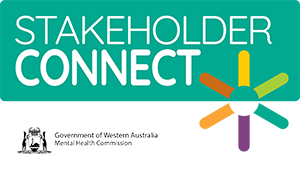
Sustainable Health Review
The Sustainable Health Review Forum was held on 20 October 2021 at the State Reception Centre at Kings Park. The event was well attended by approximately 170 people from across the sector including clinicians, consumers, carers, and executives from the Department of Health, Health Service Providers, peak bodies and community organisations.
The Forum provided the opportunity for system and sector leaders to come together to workshop initiatives aimed at progressing transformation to deliver better outcomes for the people of Western Australia.
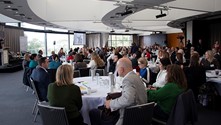
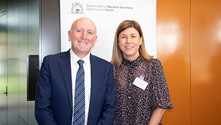
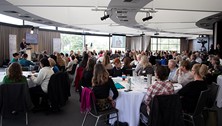
Mental Health Act Statutory Review
The Mental Health Act 2014 (the Act) provides for the treatment, care, support and protection of people who have a mental illness; the protection of the rights of people who have a mental illness; and the recognition of the role of families and carers in providing the best possible care and support to people who have a mental illness, in the least restrictive environment.
A Statutory Review of the Act is currently underway and people who have had experience under the Act are encouraged to provide feedback. A discussion paper has been prepared to assist you in providing feedback.
Information on providing feedback is available here. Submissions close 31 January 2022.
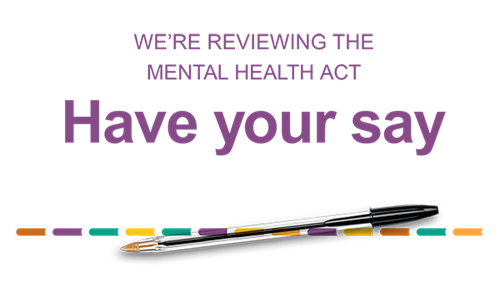
The Mental Health Commission has awarded 13 grants to organisations to facilitate face-to-face engagements with diverse stakeholders who have lived experience with treatment under the Act over the past five years in Western Australia.
The organisations are involved with consumers, families and carers from a diverse range of stakeholder groups. To get in contact with and enquire about the sessions they will be conducting, download the grant recipient contact information here.
Expression Of Interest - Engagement Opportunity
A Steering Group was established in early 2021 to support and guide the Review. The MHC is looking for one Family Member/Carer Representative to join the Steering Group from February 2022. Carers or family members who have a lived or living experience of caring for someone who has received treatment under the Mental Health Act (2014) are encouraged to apply for this role.
- More information about the role, including contact details for further queries can be found in the Expression of Interest.
- More information about the Terms of Reference, Guiding Principles, Governance and Steering Group can be found here.
- To apply, please complete the Application Form and return it via one of the methods specified in the form by 12 January 2022.
You can also read a summary of what we have learned so far.
Lived Experience (Peer) Workforce Project
The Mental Health Commission, in partnership with key sector stakeholders, is undertaking the Lived Experience (Peer) Workforce Project. The Project aims to guide the development of a thriving state-wide consumer, family and carer Lived Experience (Peer) Workforce across the mental health (including suicide prevention) and alcohol and other drug sectors. A Steering Committee assisted by a Peer Practice Expert Group and Sector Reference Group has been progressing the Project which, to date, has also been informed by a series of face-to-face and virtual pre-design workshops which engaged with consumers, carers and family members, peer workers and service providers.
In late November the Commission and ‘wellrounded’ hosted an 'In the Frame' All of Stakeholder Co-design Workshop at Claisebrook Design Community to bring together and further develop key themes in more detail. The unique walk around gallery style of the workshop saw over 160 participants, including the Minister for Mental Health, The Hon Stephen Dawson MLA, engage with the very positive energy and enthusiasm generated by the desire to develop a thriving Peer Workforce.
The outcome of the Project, including a Framework and recommendations to build capacity of the Peer Workforce, will be tailored to a WA context, ensuring the perspectives and nuances of both the mental health and alcohol and other drug sectors are reflected. More information about the Project including the Terms of Reference and Steering Committee Communiques can be found here or by emailing the Engagement Team at engagement@mhc.wa.gov.au
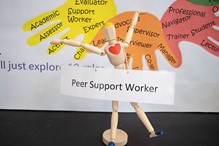
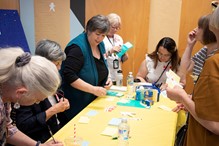
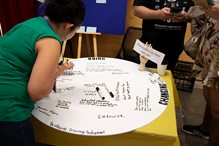
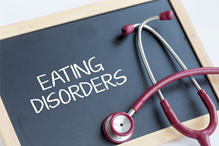
Eating Disorders
In 2021-22 the WA Government committed to investing $31.7 million in expanding and providing new eating disorder treatment services in WA for those aged 16 and over. The expanded WA Eating Disorder Specialist Services will use a shared care approach, bringing together clinical and community services and helping consumers and family members/carers to access and navigate the appropriate care throughout their recovery journeys.
The expansion will include: Two dedicated multidisciplinary services, one each located in the north and south metropolitan area, that will be accessible to people from across WA. Each will provide a triage service, intensive day programs, intensive clinical monitoring to provide support to people in the community, and specialist multidisciplinary outpatient clinics that include a step-down service for inpatients with eating disorders.
Patient transition coordinators will coordinate the care of people living with eating disorders.
Read more in the Frequently Asked Questions.
Public Education and Health Promotion Programs
The Alcohol.Think Again campaign is WA’s key state-wide public education and awareness raising program that aims to reduce the level of alcohol-related harm in the community. One element of this program is a new Parents, Young People and Alcohol campaign. The campaign supports the National Health and Medical Research Council (NHMRC) guidelines which state that children and young people under 18 years-of-age should not drink alcohol. Alcohol has harmful effects on the developing brain and research that the more adolescents drink, the more likely they are to experience alcohol-related problems in adulthood.
The new campaign will be on air early in 2022. For more information on young people and alcohol visit Alcohol.Think Again | Reducing Alcohol-Related Harm & Health in WA or contact campaigns@mhc.wa.gov.au
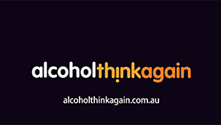
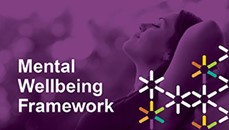
Mental Wellbeing Framework
The Mental Health Commission is developing the Western Australian Mental Wellbeing Framework to define the foundations and best practice initiatives for the promotion of wellbeing and prevention of mental health conditions in Western Australia. State-wide consultation has recently concluded, and the Consultation Report will be provided on our website in early 2022.
Read more here or email us at mhcwellbeingframework@mhc.wa.gov.au
Safe and Healthy Settings
The Mental Health Commission has committed to co-design and develop a support resource with Local Government Authorities, primarily for their use in public health planning processes. The resource will be for Local Governments which identify illicit drugs, misuse of pharmaceuticals and other drugs of concern as an issue to be included in their public health plan. An initial state-wide webinar consultation with Local Government Authorities has been completed in collaboration with the WA Local Government Association and development is progressing. For further information email MHCSafeandhealthysettings@mhc.wa.gov.au

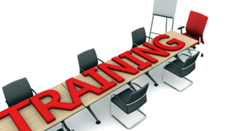
Workforce Development
The Workforce Development team develops and delivers a range of training and other workforce development activities to build the capacity of human service providers to improve outcomes for people with alcohol and other drug-related issues.
Workforce Development deliver a range of training opportunities including training for alcohol and other drug workers, volunteers and people working in human services.
For further information contact aod.training@mhc.wa.gov.au or phone (08) 6553 0560.
Sobering Up Centres
The Commission is progressing recommendations from the 2019 independent review of Sobering up Centres (SUC) in Western Australia. This will involve undertaking community stakeholder consultation to co-design a stronger, more appropriate model of service to meet current demands. The process will include a joint forum with the Department of Communities scheduled for February 2022.
For further information contact cssm.correspondence@mhc.wa.gov.au
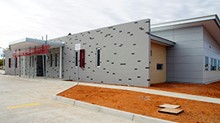


Supported Accommodation and Personalised Support - Other
As part of the Commission’s commitment to ensure best practice services are available to the Western Australian community, the Commission is reviewing existing Supported Accommodation services and undertaking a program review of Personalised Support – Other (PSO) services.
These reviews will aim to ensure models of support, treatment, funding and commissioning arrangements meet contemporary needs with best practice approaches. Consultation will include engagement with service providers and people with a Lived Experience, including consumers and family members/carers, to guide service improvement and best practice innovation.
For further information please contact the Community Services NGO Contracting team on cssm.correspondence@mhc.wa.gov.au
Diversion Psychosocial Service
The Commission will be conducting an open tender process for the diversion psychosocial service provision for both Start Court and Links.
The Mental Health Court Diversion Program (the Program) offers a tailored response for individuals whose offending is linked to mental illness.
Program participants are supervised by a Court while they receive holistic support that addresses the underlying causes of their offending behaviour. This approach aims to enhance participants’ health and wellbeing, improve community safety, reduce repeat offending and, where appropriate, provide an alternative to imprisonment.
There are separate programs for adults and children:
Both Courts provide services for people affected by alcohol and other drugs and mental illness challenges. This process will include wide community consultation on the service model delivered, including consultation with those with lived experience and family members and carers. The consultation will include the Department of Justice and the court-based health service providers.
For further information please contact the Community Services NGO Contracting team on cssm.correspondence@mhc.wa.gov.au
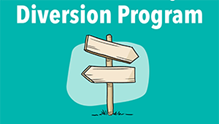
Aboriginal Youth Reference Group
The Aboriginal Youth Reference Group has been established to ensure young Aboriginal people (12-25 years) have a voice and can inform the direction of the Strong Spirit Strong Mind Youth Project. This initiative aims to educate young Aboriginal people across WA about alcohol and other drug use. Currently, there are 10 members and the last meeting was held in September 2021, with one more scheduled to be held prior to the close of 2021. For further details please contact Angel Hayward – angel.hayward@mhc.wa.gov.au or telephone 6553 0562.
Useful NDIS Resources for Service Providers, Consumers, Carers and Families
As part of the Mental Health, Alcohol and Other Drug Workforce Strategic Framework: 2020-2025 a range of NDIS resources for service providers, consumers, carers and families have been developed. The aim is to create an online repository of information to support psychosocial disability service providers to develop their organisational capacity to appropriately operate under the NDIS funding model.
More information is available here.

Mental Health Network Annual Report 2020/21
The Mental Health Network (MHN) operates under the governance of the Mental Health Commission and is a key stakeholder in the Commission's Stakeholder Engagement and Partnership Framework. The MHN have released their annual report for 2020/21, which is available here.
You can find out more information about the MHN here.
Find out more about Stakeholder Connect, or subscribe to newsletters here. To change your newsletter or email preferences, please email us engagement@mhc.wa.gov.au
